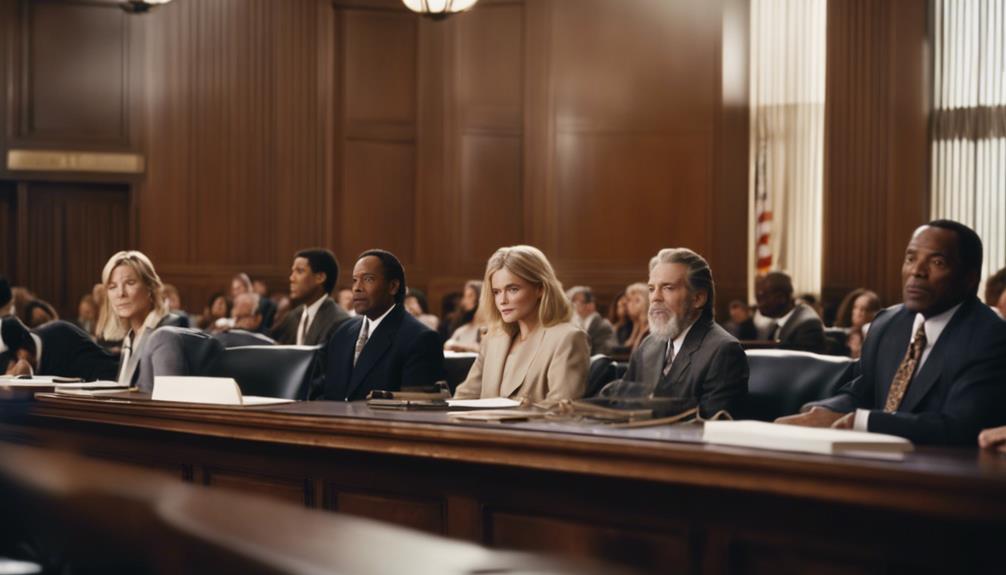The Internal Revenue Service (IRS) has consistently demonstrated its willingness to prosecute high-profile individuals for tax evasion, with celebrities like Wesley Snipes, Pete Rose, and Willie Nelson facing significant legal consequences, including prison sentences and hefty fines, for their failure to comply with tax laws. The consequences of non-compliance are severe, with the IRS issuing almost 34 million penalties in 2020, generating $14 billion in revenue. As these cautionary tales illustrate, the importance of proper tax planning and compliance cannot be overstated, and it's vital for high-net-worth individuals to guarantee financial stability by adhering to tax laws. Further examination reveals the complexities and nuances of celebrity tax evasion cases.
Key Takeaways
• Celebrity tax evasion cases, like Wesley Snipes and Pete Rose, serve as cautionary tales for high-profile individuals to prioritize tax compliance.
• Hefty fines and prison sentences await non-compliant individuals, highlighting the importance of tax planning and compliance.
• The IRS takes tax evasion seriously, with severe legal consequences, including fines and imprisonment, for willful neglect of tax obligations.
• Notorious tax evaders in history, like Al Capone, demonstrate the severe legal consequences of non-compliance.
• Preventing tax evasion requires implementing stringent financial controls, conducting regular audits, and educating on tax laws and consequences.
Celebrity Tax Evasion Cases
From Wesley Snipes to Pete Rose, numerous high-profile celebrities have faced the consequences of tax evasion, highlighting the financial pitfalls that can accompany fame.
In 2008, Wesley Snipes was convicted on three misdemeanor charges of failing to file federal taxes and served a three-year prison sentence for tax evasion. Similarly, Pete Rose pleaded guilty to charges of filing false tax returns in 1990, emphasizing the importance of seeking help to avoid financial troubles.
These cases demonstrate the seriousness with which the IRS approaches tax evasion. The consequences of non-compliance can be severe, including prison sentences and hefty fines. Celebrity tax evasion cases serve as cautionary tales, showcasing the financial difficulties experienced by high-profile individuals despite their fame.
These cases underscore the importance of accurate and timely tax filing, lest one face the wrath of the IRS. By examining these cases, it becomes clear that tax evasion is a risky game, one that can lead to financial troubles and even a prison sentence.
Financial Consequences of Non-Compliance

Celebrity tax evaders often face severe financial consequences, including hefty fines and even prison sentences, as a result of their non-compliance with tax laws. The Internal Revenue Service (IRS) takes tax evasion very seriously, and those who fail to comply with tax laws can expect to face significant financial troubles.
For instance, Wesley Snipes was convicted of tax evasion and served a three-year prison sentence. Similarly, Pete Rose pleaded guilty to filing false tax returns, highlighting the importance of seeking help to avoid financial troubles. In another high-profile case, Willie Nelson faced a massive tax bill of approximately $16.7 million, which he creatively resolved through album sales.
These cases underscore the significance of proper tax planning and compliance to prevent financial misbehavior and legal repercussions. Failure to adhere to tax laws can lead to severe legal consequences, including fines and imprisonment. It's essential for individuals, especially high-net-worth individuals, to prioritize tax compliance to avoid financial troubles and ensure a stable financial future.
Legal Definition of Tax Evasion

According to Section 7201 of the Internal Revenue Code, tax evasion is legally defined as the willful attempt to evade or defeat the payment of taxes using illegal methods, fraudulent schemes, or deceitful practices. This definition underscores the seriousness of tax evasion, which can lead to criminal charges, fines, and imprisonment.
Taxpayers, including celebrities, must recognize that tax evasion is a criminal offense that can result in severe legal consequences. The IRS regulations are clear: intentional failure to pay taxes or filing false returns can lead to prosecution. Notable examples include celebrities like Wesley Snipes and Pete Rose, who've faced legal consequences, including prison sentences, for tax evasion.
To avoid these pitfalls, it's crucial to prioritize proper tax planning and compliance. By understanding the legal definition of tax evasion, individuals can take steps to ensure they're meeting their tax obligations and avoiding the risks associated with tax evasion.
Notorious Tax Evaders in History

Notorious tax evaders have made headlines throughout history, often serving as cautionary tales for those who think they can outsmart the system. From legendary gangster Al Capone to celebrities like Wesley Snipes and Leona Helmsley, these high-profile cases demonstrate the severe legal consequences of tax evasion.
These infamous examples will be examined in detail, highlighting the financial and professional repercussions that can result from such illegal activities.
Al Capone's Tax Troubles
In the 1930s, Al Capone's lavish lifestyle and unchecked power as a crime lord came crashing down when the Internal Revenue Service (IRS) finally caught up with him over unpaid taxes on his illicit income. For years, Capone failed to pay taxes on his illegal earnings from organized crime activities, thinking he was above the law. However, the IRS persisted, and in 1931, Capone was convicted of tax evasion.
| Year | Event |
|---|---|
| 1931 | Al Capone convicted of tax evasion |
| 1930s | IRS pursues Capone for unpaid taxes |
| 1930s | Capone's imprisonment and financial downfall |
Capone's tax troubles led to his imprisonment and downfall as a powerful criminal figure. This high-profile case highlights the IRS's efforts to combat tax evasion, even among high-profile individuals. As the IRS proved, no one is above the law, and tax evasion has serious consequences. Capone's financial downfall serves as a cautionary tale for those who think they can evade taxes without repercussions.
Wesley Snipes' Jail Time
As Al Capone's case demonstrated the IRS's relentless pursuit of tax evaders, another celebrity, Wesley Snipes, would soon follow in his footsteps, facing severe consequences for his own tax evasion.
In 2008, Snipes was convicted on three misdemeanor charges of failing to file federal taxes, which resulted in a three-year prison sentence for tax evasion related to his failure to report income. Snipes' case highlighted the serious consequences of not fulfilling tax obligations, serving as a cautionary tale for individuals regarding tax compliance.
Despite his fame, Snipes faced significant penalties for his involvement in tax evasion. His legal troubles underscore the importance of tax compliance, emphasizing that no one is above the law, regardless of their celebrity status.
Snipes' experience serves as a stark reminder that tax evasion can lead to severe legal repercussions, even for high-profile individuals.
Leona Helmsley's Hotel Hassle
Leona Helmsley, the infamous 'Queen of Mean,' fell from grace in 1989 when she was convicted of tax evasion for fraudulent business expenses. Her lavish spending and mistreatment of employees contributed to her negative public image during the trial. Despite her wealth and power, Leona Helmsley's tax evasion scheme ultimately led to her downfall and tarnished her reputation as a prominent figure in the hospitality industry.
Helmsley was sentenced to 16 years in prison but served only 18 months, along with a hefty fine of $7.1 million.
The high-profile case highlighted the consequences of tax evasion and the scrutiny faced by wealthy individuals in the public eye.
The IRS took notice of Helmsley's lavish spending, including renovations to her Connecticut mansion, which she claimed as business expenses.
The IRS Investigation Process

IRS agents meticulously scrutinize tax returns, financial records, and activities of individuals suspected of tax evasion, leaving no stone unturned in their pursuit of accuracy and adherence.
During an IRS investigation, agents conduct audits, interviews, and reviews to gather evidence and assess the accuracy of reported income and deductions. They use various tools and techniques, such as data analysis, forensic accounting, and surveillance, to detect and investigate potential tax evasion.
These investigations may uncover discrepancies, unreported income, fraudulent activities, or deliberate attempts to evade taxes. By meticulously examining tax returns and financial records, IRS agents can identify red flags that indicate potential tax evasion.
Through their thorough investigations, the IRS aims to uphold compliance with tax laws and regulations, and ensure that those who engage in tax evasion are held accountable.
Penalties for Tax Evasion

Celebrities who evade taxes can face severe penalties, including criminal charges, fines, and even jail time. These consequences can be devastating to their reputation and finances.
When caught, they may be forced to pay hefty fines, serve time behind bars, or both, as seen in the cases of notorious figures like Al Capone and Lauryn Hill.
Criminal Charges Filed
Faced with the prospect of criminal prosecution, celebrities like Wesley Snipes, Pete Rose, and Willie Nelson have learned the hard way that tax evasion can lead to severe legal consequences. These celebrities have been slapped with criminal charges, highlighting the importance of compliance with the IRS.
- Wesley Snipes was convicted in 2008 on three misdemeanor charges of failing to file federal taxes and served a three-year prison sentence.
- Pete Rose pleaded guilty to filing false tax returns in 1990, highlighting the importance of seeking help to avoid financial troubles.
- Willie Nelson received a tax bill of roughly $16.7 million in 1990 and creatively resolved the debt through album sales.
These cases underscore the legal consequences and penalties associated with celebrity tax evasion, emphasizing the need for proper tax planning and compliance. The IRS takes tax evasion seriously, and these celebrities have learned that the consequences of tax evasion can be severe, leading to financial troubles and even criminal charges.
Fines and Penalties Imposed
Severe penalties, including monetary fines and even criminal prosecution, await those who fail to comply with tax laws, as evidenced by the millions of penalties issued by the IRS each year.
In 2020, the IRS issued almost 34 million penalties against individual and estate taxes, generating $14 billion in tax income. Common penalties for tax evasion include failure to pay, non- or underpayment of estimated tax, and delinquency.
Celebrities aren't immune to these penalties, with notable figures like Busta Rhymes, Lindsay Lohan, and Trey Songz facing significant tax bills and liens. Athletes such as Plaxico Burress and Pete Rose have also encountered federal tax liens and fraud charges.
The penalties for tax evasion can be steep, and celebrities aren't exempt from the consequences of failing to comply with tax laws. The IRS takes tax evasion seriously, and those who fail to comply can face severe fines and penalties.
Jail Time Sentence
As a consequence of tax evasion, individuals, including high-profile celebrities, can find themselves serving time behind bars, as the law takes a hard stance against those who willfully neglect their tax obligations. The consequences of tax evasion can be severe, and high-profile celebrities aren't exempt from facing jail time. Wesley Snipes, for instance, served a three-year prison sentence after being convicted on three misdemeanor charges of failing to file federal taxes.
The legal consequences of tax evasion can include substantial prison sentences, as seen in cases like Wesley Snipes'. Jail time is a common penalty for high-profile individuals found guilty of tax evasion, highlighting the seriousness of the offense.
- Jail time is a real consequence of tax evasion, as seen in the case of Wesley Snipes.
- Celebrities aren't exempt from facing prison sentences for tax evasion.
- The law takes a hard stance against those who willfully neglect their tax obligations, including high-profile individuals.
Celebrity Tax Evasion Examples

Several high-profile celebrities have fallen victim to tax evasion, with notable examples including Wesley Snipes, Pete Rose, and Willie Nelson, who've all faced legal consequences for their financial misdeeds.
Wesley Snipes, for instance, was convicted in 2008 on three misdemeanor charges of failing to file federal taxes and served a three-year prison sentence for tax evasion. Similarly, Pete Rose pleaded guilty to charges of filing false tax returns in 1990, emphasizing the importance of seeking help to avoid financial troubles.
Willie Nelson, on the other hand, faced a tax bill of roughly $16.7 million in 1990 but creatively resolved the debt through album sales. These examples showcase the repercussions of financial misbehavior, highlighting the significance of proper tax planning and compliance for celebrities to avoid such pitfalls.
Understanding the legal consequences of tax evasion is vital, as it can lead to severe financial troubles and even legal consequences. These cases serve as a warning to celebrities and individuals alike, emphasizing the importance of responsible financial management.
Preventing Tax Evasion in Practice

Many celebrities and individuals can prevent tax evasion by implementing stringent financial controls and oversight, conducting regular audits, and educating themselves on tax laws and consequences. By doing so, they can avoid the financial pitfalls that come with tax evasion.
Preventing tax evasion in practice requires a proactive approach, and individuals can take several steps to guarantee compliance with tax regulations.
- Implementing financial controls and oversight to monitor financial transactions and identify potential discrepancies
- Conducting regular audits to review financial records and detect any irregularities
- Educating themselves on tax laws and consequences to understand the implications of tax evasion
Frequently Asked Questions
Who Is the Most Famous Tax Evasion Case?
Wesley Snipes is often considered the most famous tax evasion case. He was convicted in 2008 for failing to file federal taxes and served a three-year prison sentence.
His high-profile case serves as a prime example of the serious consequences of tax evasion. Snipes' case underscores the importance of seeking financial help and compliance to avoid financial downfall.
What Famous Person Did Not Pay Taxes?
Wesley Snipes, a renowned actor, failed to file federal taxes, resulting in a 2008 conviction on three misdemeanor charges.
Similarly, Pete Rose, a legendary baseball player, pleaded guilty to filing false tax returns in 1990.
Additionally, Willie Nelson, a music icon, faced a substantial tax bill of approximately $16.7 million in 1990.
These celebrities' tax troubles serve as cautionary tales, highlighting the importance of proper tax planning and compliance to avoid legal issues.
What Celebrity Has Gotten Into Tax Trouble?
Several celebrities have gotten into tax trouble. Wesley Snipes served a three-year prison sentence for tax evasion, while Pete Rose pleaded guilty to filing false tax returns.
Willie Nelson creatively resolved his $16.7 million tax debt through album sales.
These cases highlight the importance of proper tax planning and compliance, as willfully attempting to evade or defeat taxes can result in severe legal consequences.
Why Did Wesley Snipes Think He Didn't Have to Pay Taxes?
Wesley Snipes believed he didn't have to pay taxes due to his involvement with American Rights Litigators, a group that promoted anti-tax ideologies. They claimed that only income from foreign sources was taxable, and Snipes, misled by this false information, stopped paying his taxes.
This misguided belief led to his criminal conviction and subsequent prison sentence, serving as a cautionary tale about the dangers of tax evasion.
Conclusion
To sum up, celebrity tax evasion is a costly game that few can afford to play. The financial downfalls are staggering, with penalties, fines, and even imprisonment lurking around every unfiled return.
From Al Capone to Wesley Snipes, the IRS has a long history of bringing even the most powerful to their knees. Don't be fooled – the consequences of tax evasion far outweigh any perceived benefits.
As the IRS so aptly puts it, 'Voluntary compliance is the backbone of our tax system.' Heed the warning, or face the music.











